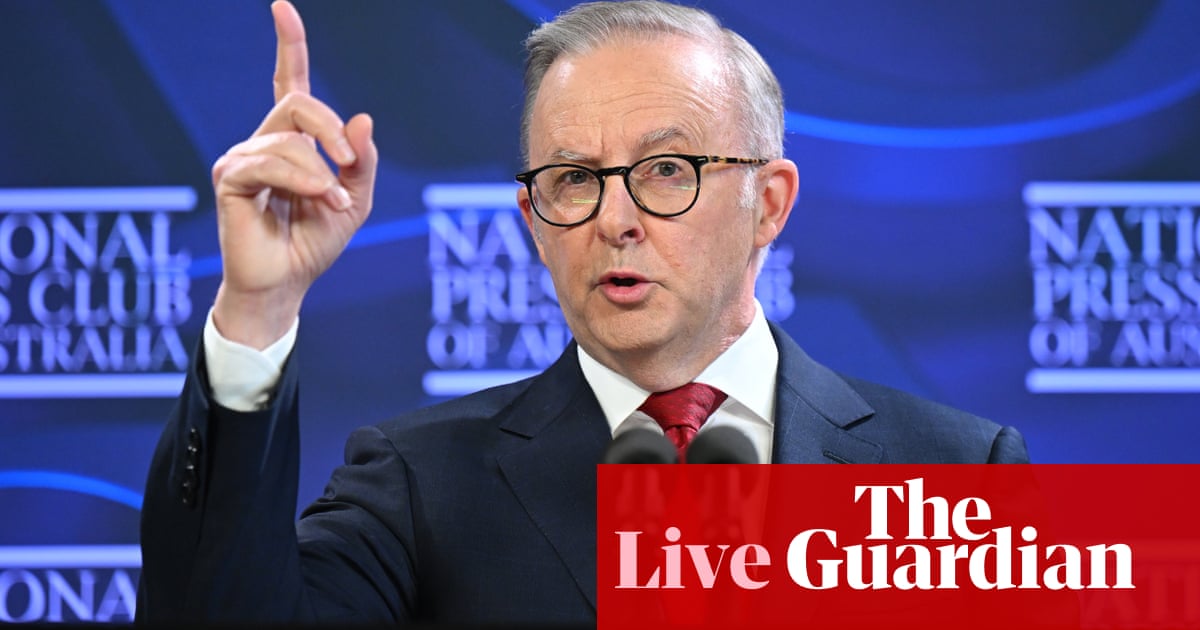New CPI figures show underlying inflation has fallen below 3% for the first time in three years. Photograph: ginevre/Getty ImagesView image in fullscreenNew CPI figures show underlying inflation has fallen below 3% for the first time in three years. Photograph: ginevre/Getty ImagesAustralian economyRate cut likely as underlying inflation falls within RBA target rangeHeadline inflation – which includes the impact of government cost-of-living policies such as rebates – held steady at 2.4% in the year to March
Election 2025 live updates: Australia federal election campaign
Polls tracker; Election guide; Interactive seat explorer
Party policies; Micro parties explained; Full election coverage
Listen to the latest episode of our new narrative podcast series: Gina
Get our afternoon election email, free app or daily news podcast
Patrick Commins Economics editorWed 30 Apr 2025 03.34 BSTFirst published on Wed 30 Apr 2025 03.00 BSTShareA Reserve Bank rate cut on 20 May appears locked in as new data shows the key measure of underlying inflation has dropped below 3% for the first time in three years.Headline inflation – which includes the impact of government cost-of-living policies such as rebates – held steady at 2.4% in the year to March, the Australian Bureau of Statistics figures show.Crucially, the RBA’s preferred gauge – the trimmed mean rate of inflation – fell from 3.3% in the year to December to 2.9% in March.Jim Chalmers told a Wednesday press conference the latest figures were “a powerful demonstration of the progress that Australians have made together in the economy”.Inflation graphWith an eye to Saturday’s election, the treasurer highlighted that “the market is expecting somewhere between four and five additional interest rate cuts this year, and if that eventuated that would deliver hundreds of dollars every month to Australians with a mortgage”.
Sign up for the Afternoon Update: Election 2025 email newsletter
“I’m not making a prediction about that, but the market has a very firm view that there are more interest rate cuts on the way, and I don’t see anything in these numbers that would substantially alter their expectations,” Chalmers said.The RBA in February cut rates for the first time in four years, and there is a firm consensus among economists and investors that the central bank’s monetary policy board will lower the cash rate from 4.1% to 3.85% at the next two-day meeting on 19-20 May.The Australian Bureau of Statistics (ABS) said a 3.2% annual increase in the cost of food and non-alcoholic beverages (essentially supermarket items) was a main contributor to overall inflation in the year to March, alongside a 6.5% rise in alcohol and tobacco prices.Housing costs are still a major driver of inflation, the data shows.Average rental costs were up 5.5% on a year earlier, even if the trend was favourable: they climbed 6.4% in the year to December and were rising by nearly 8% this time in 2024.skip past newsletter promotionSign up to Afternoon Update: Election 2025Free daily newsletterOur Australian afternoon update breaks down the key election campaign stories of the day, telling you what’s happening and why it mattersEnter your email address Sign upPrivacy Notice: Newsletters may contain info about charities, online ads, and content funded by outside parties. For more information see our Privacy Policy. We use Google reCaptcha to protect our website and the Google Privacy Policy and Terms of Service apply.after newsletter promotionThe annual increases in the consumer price indexes were 0.1 percentage points higher than expected by economists, where the consensus forecasts had been for 2.3% at the headline level, and 2.8% for the underlying measure.Electricity prices jumped by 16.3% in the March quarter, the ABS data shows, as most of the $1,000 energy rebates in Queensland were used up at the end of last year, leaving higher out-of-pocket costs for households.It was a similar story in other states and territories, as taxpayer-funded bill relief rolled off.Still, the ABS said, electricity prices remained down 12% from a year earlier.Explore more on these topicsAustralian economyAustralian election 2025Australian politicsInflationInterest ratesReserve Bank of AustraliaCost of living crisisnewsShareReuse this content










